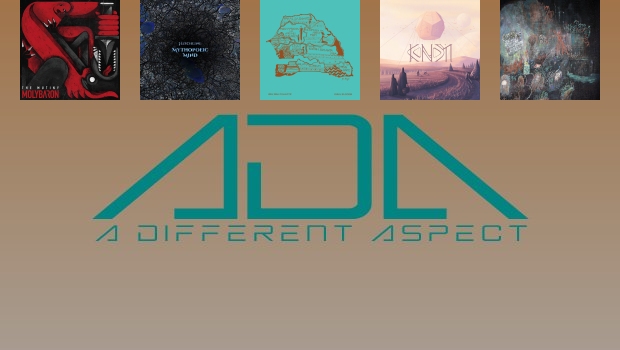Featured artists: Molybaron | Mythopoeic Mind | Wau Wau Collectif | Konom | Blessings ||:
In this ADA (shorter reviews) update Nick Hudson takes a look at recent releases from…
• Molybaron – The Mutiny
• Mythopoeic Mind – Hatchling
• Wau Wau Collectif – Yaral Sa Doom
• Konom – Konom
• Blessings – Biskopskniven
Nick Hudson
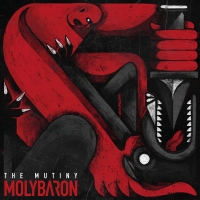
I had never heard of French/Irish band Molybaron until this year, when for a short time they seemed to be touted as the ‘Next Big Thing’. Intrigued, I had a listen to their debut, which was nice enough but didn’t really do that much to impress me. Moving on to this year’s The Mutiny, all that changed. It has a bigger and better sound in every way. It slams, but in an almost radio-friendly manner. It’s a crossover style of progressive metal that should go down well across multiple audiences, and it’s no wonder they might have been the Next Big Thing. For whatever reason, that seems not to have happened, and that’s a great shame because The Mutiny really rocks, full of stadium-ready anthemic choruses, massive riffs, and a pounding and dynamic rhythm section.
As odd a combination as it might sound, Molybaron sound like a mix of Tool and Muse, or perhaps Mastodon and Biffy Clyro? Gojira and Foo Fighters? To add even more question marks, Therapy? and Queens of the Stone Age? Heck, I know none of those sound quite right as pairs, but it at least perhaps gives you an idea of the heaviness matched with an almost pop aesthetic that Molybaron have perfected. I’d probably stick with Tool and Muse, as they are the two bands I’m most reminded of. Will you hear that? Perhaps not, but I’m sure whatever you do hear, you’ll understand where I’m coming from. It’s all so damn catchy, and almost every song has an earworm or two that digs into my brain, popping up every now and then just to remind me it’s still there. Honestly, my brain is so riddled with worms right now, I ought to be a zombie.
Although often explored in allegory, lyrically The Mutiny seems to be a very personal (and possibly biographical) affair, concerned with mental health and personal demons. At times they are not at all comfortable to listen to, but even if they might hint at a fragile mental state, the vocals are strong and passionate. The music is equally confident and impassioned. Melodic and frenetic, almost to the point of being bombastic, music and vocals soaring to crazy levels. Some of the songs are simply relentless and bruising in their attack. It’s almost a case of offence being the best form of defence, as the songs belie the ugliness at the heart of the lyrics.
The album just pounds and pounds, and keeps the listener engaged and driven onwards, or perhaps downwards. It’s a wild and edgy ride that makes a perfect driving album – although it’s probably a good idea to keep an eye on the speedo, as it is easy to accelerate more than is necessary when listening to The Mutiny. Quite simply, Molybaron are a pleasure to listen to, and The Mutiny is easily one of favourite albums of 2021. It is bound to be one of those albums that will generate stupid arguments as to how prog it actually is, but I’ve never been one to care much about that. It’s great music, and that’s all that really matters.
Nick Hudson
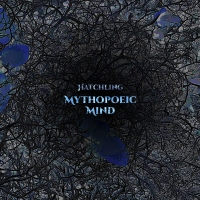
From the opening notes, Hatchling reveals itself to be a very different beast from Mythopoeic Mind’s debut. Mythopoetry was a thoroughly enjoyable and melodic, jazzy and symphonic album that was relatively accessible and mainstream. While the tracks often betrayed the avant RIO and Canterbury influences of the band members, the songs were almost radio-friendly. I absolutely loved the album, and was quite excited to hear the next instalment. But while Mythopoetry was immediately enchanting, Hatchling took more than one listen for me to appreciate. There’s nothing wrong with that, there are plenty of albums in my collection that I adore, that I was not so fond of on first hearing. Sometimes it takes a few listens to get an album.
For me, Hatchling is somewhat of a misnomer. To my ears, Mythopoetry was the hatchling, and Hatchling is the fledgling. The band has grown enough to begin experimenting and take flight, in a half awkward and half endearing way. Hatchling comes across as far more spontaneous and improvised, and while it never strays into real avant territory, the hints of RIO are far stronger than in the more symphonic Mythopoetry. The introduction to Fear Fiesta is pretty much avant chamber prog, before the beat kicks in and the fiesta becomes funky. And then come the idiosyncratic vocals of Veronika Hørven Jensen. Yes, this is definitely a different sound from Mythopoetry. If I didn’t know, I might not even realise it is the same band. Yet all the named members of Hatchling, apart from Veronika, were in the band that created Mythopoetry.
Ok, maybe I am over-emphasising the difference, but I just want to portray how surprised I was when I first heard this, and how unsure I was about how much I liked it. So the key question is, what do I think now? The answer is that I now love this album, and more so than its predecessor. So, if you like a bit of angular and edgy music, this is for you. Trond Gjellum absolutely shines on the drums. (I’m a big Trond fan!) Ola Mile Bruland not only complements Trond beautifully with fretless and double bass, but plays the euphonium. When it appears, it’s a fantastic sound, an instrument too rarely played, as far as I’m concerned, so it’s great to hear it. And, of course, the sax of leader Steinar Børve’s is always prominent. Throw in the trumpet of (keyboard player) Pål Selsjord Bjørseth, and then a pinch of bassoon on the the title track, from guest Lars-Jarand Bakkelund, and you have a magnificent recipe for musical greatness.
Nick Hudson
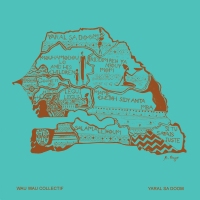
What do you get when you put together musicians from Sweden and Senegal? One of the most enjoyable albums of 2021, that’s what. Yaral Sa Doom has been a firm favourite of mine since its release in February. It has a joyful innocence and exuberance that is enchanting and endearing. Originating from Karl Jonas Winqvist’s 2018 sojourn in Senegal, and continuing long-distance upon his return, Yaral Sa Doom combines recordings from Senegal and overdubs from Sweden to make a truly worldly album that spans genres and continents. Caught between electronica, nu-jazz, folk and dub, the sound of Yaral Sa Doom is a glorious mishmash that can’t fail to put a grin on your face.
There’s a great deal of what could be considered hyperbole on the Bandcamp page, but upon reflection, it’s hard to call any of it exaggeration. Yaral Sa Doom is what it is, and what it is is really quite amazing. Despite having contributions from over 20 performers from two geographically and culturally distant countries, there is a pleasing simplicity to Yaral Sa Doom that is almost disingenuous. After all, the many layers and loops of sound are really quite complex – so making something so complex sound so simple is a feat in itself. When you consider how the music has been passed back and forth between Sweden and Senegal multiple times, it’s really quite astounding that the sound is as mellifluous as it is! Karl Jonas Winqvist and his Senegalese counterpart Arouna Kane have created a unique sound that is dominated by the musical style of neither country.
Even if children were not involved, there is a childlike innocence and naivety to the music, which I absolutely love. The fact that some of the contributors are children is simply an added delight. Speaking of innocence, I think it’s wise to address that this collaboration is innocent of the accusations of exploitation and appropriation that could so easily be thrown at it. Yes, this project began off the back of a white European’s temporary stay in an African nation, but the only manipulation is of sound samples. There is true engagement and reciprocity between the Swedish and Senegalese contributors, and all are credited by name and receive equal royalties. The overall aesthetic of the album is one of kindness and sharing.
Nick Hudson
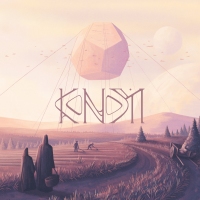
Konom have released an impressive eponymous debut, that sits somewhere between obvious classic prog influences and more modern prog metal. It’s this stance, neither quite here nor there, that originally made me unsure of the album; and conversely that made it one I now enjoy greatly. By not slavishly staying within the confines of musical style from one era or genre, the way many new bands do, they have created a sound that is far more original than it might first seem. Yes, for sure, there will be those who label Konom another Dream Theater clone, and it would be a fool who attempts to argue that Dream Theater have not been an obvious influence. But there is so much more to the sound of Konom than any passing (and it really is passing) resemblance to the prog metal behemoth, and certainly containing far greater vitality, energy and passion than that band seems capable of lately.
So, as much as I might make comparisons to Dream Theater, Porcupine Tree or Leprous, I could just as easily make comparisons to Genesis and Yes. And, for that matter, some Gentle Giant and Rush. In fact, the heaviness of Konom is far closer to that of Rush than Dream Theater, and there is definitely a pastoral feel to the music that very often reminds me of Genesis. Another obvious influence, and one noted on the Bandcamp page, is Frost*, and Jem Godfrey even makes a guest appearance on one song. Musically, at least – as the vocals of Arya Bobaie are something else, entirely. In fact, the vocals are what could well make or break the album for a lot of listeners, because Arya has a very different and distinctive singing style. It did put me off initially, and I put the album on the back burner, possibly never to return to it, simply because I really wasn’t sure I could deal with Arya’s histrionics.
It was complete chance that a Konom song came up when I had my iPod on shuffle one night as I was going to sleep. On the threshold of dreams, I suddenly sat bolt upright, because the song I was listening to was incredible, and I had no idea who it was. I listened to the album again the next day and was blown away. I love that it is largely heavy without being metal. The guys are quite clearly proficient, and could easily churn out a prog metal wankfest if they chose to, but there is a great deal of restraint in the music (if not so much in the the vocals). I mentioned the pastoral and Genesis feel, and I think this is almost best represented by the cover art, which is quite lovely. It has a sci-fi look – technologically advanced worlds where civilisation has somehow collapsed, and society has gone back to basics and a more primitive way of life. That’s the sort of pastoral quality this album has, and reflects the way the sound of the band has a classic style that you couldn’t really call retro, as it clearly comes from more modern times. Don’t make the same mistake I did, and dismiss the album after too few listens.
Nick Hudson
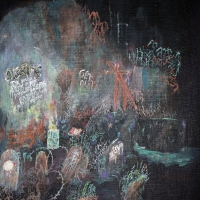
How to describe Biskopskniven from Sweden’s Blessings. It’s a far harder question to answer than it should be. Ostensibly a post-hardcore/noise band, Blessings are definitely reminiscent of a band like At The Drive-In, but there is so much more to their sound on this album. Behind the wall of noise and post-hardcore vocals, there’s an almost Krautrock influence in the mechanistic and repetitive rhythms and sludgy riffs. It’s an intriguing eclectic mix of sounds that offers far more than one might expect. There are layers upon layers of sound within the wall of noise, some so well insulated they are not immediately apparent, so that it becomes possible to still hear new things long after I thought I was familiar with the album.
What’s more, the wall of noise is not all-encompassing, and there are quieter and acoustic passages that provide relief and variety. That’s a good thing, as otherwise the album would be rather relentlessly overwhelming, and there’s only so much battering my eardrums can take before becoming fatigued. I can honestly say that’s never been the case with Biskopskniven. The surprising diversity of sounds holds my attention easily and enjoyably. The monstrous creativity of Blessings is positively Frankenstein-esque, plucking parts from wherever they can, and putting them together in a manner that is hardly conventional, and potentially confrontational. Caught somewhere between aggressive and atmospheric, and frequently making a strange hybrid of the two, Biskopskniven is easier to listen to than to describe.
Strong to the end, the final three songs are perhaps my favourites. Old Bones is certainly a great way to sample the oddities of the album, with its clashing stylistic choices crashing against each other in a harmonious fashion that shouldn’t be possible. Despite being an uncompromising battering ram of an album, there are plenty of melodic moments. It’s not so much a case of ‘Beauty and the Beast’, as ‘Beauty is the Beast’. Like Frankenstein’s Monster, outwardly Biskopskniven might appear huge and hideous, but it is actually eloquent and emotional. Motivated by pain and loneliness, the Monster, and Biskopskniven, are capable of both compassion and cruelty. It’s up to the listener, to see if they can find the beauty within this album, or whether they simply run away screaming…

